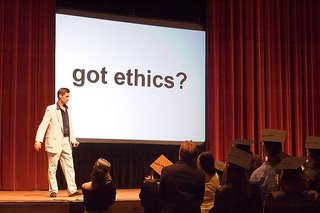
FindLaw continues to have problems with its so-called law blogs. Today’s problem: Their writer doesn’t appear to know a damn thing about law.
Why does FindLaw continue this charade of having blogs by producing crap content?
From its Philadelphia Personal Injury Law Blog (coded “NoFollow” so it doesn’t get Google juice) comes this mega-screw-up of a headline:
Doctor Found Innocent Of Malpractice
Oy. That’s what happens when non-lawyers try to write law blogs. Legal terms get thrown around willy-nilly without the writer knowing what they are doing.
It’s always been one of my pet peeves in newspapers when I see a headline declaring that someone was found “innocent” of a crime. Criminal juries, of course, don’t determine innocence. (Nor do civil trials.) Criminal trials just determine whether the prosecution sustained its burden of proof beyond a reasonable doubt. But at least when I see newspapers do it they aren’t conflating the criminal with the civil.
Memo to writer Emily Grube who continues to churn out this awful dreck at the behest of her employer: This was a civil trial and you used the language of the criminal world by waltzing into the guilt-innocence issue. That’s a whopper of a mistake, as we say in legalese.
But it’s clear this wasn’t an inadvertent mistake, because it continues in the content with this gibberish:
It took the jury less than an hour to find that Dr. Robert Stratton was not guilty of providing poor emergency room care to Dennis J. Kowalick.
Civil juries don’t determine “guilt.” That is a criminal law term. The civil jury in a malpractice case will determine negligence. And I can’t believe anyone would hire a writer for a law blog when that writer didn’t understand such fundamentals.
FindLaw obviously continues this crap because it thinks it will get SEO juice. These “blogs” are merely ads designed to dump as many SEO friendly terms onto the web, quality be damned. And if FindLaw need to use a dead child for its self-promotion, well so what, because the ends of self-promotion and making money are more important than anything else, right?
I assume that no one at FindLaw cares, since they’ve permitted this stuff to go on for months now. I would have thought that its professor-contributors from Writ: Anthony Sebok, Marci Hamilton, Michael Dorf, Carl Tobias, Sherry Colb, Joanna Grossman, Neil Buchanan, and Julie Hilden, to name a few, would have raised a ruckus since they are now associated with these shitblogs. Perhaps they don’t care either.
If FindLaw can find professors to write Writ, you would think they could find a lawyer or two to write blogs. But then, FindLaw would have to actually give a damn. Marketing appears to trump all else and remains the holy grail; produce quantity and not quality.
As Scott Greenfield discusses, anyone can have a blog, but not everyone should.
The wonder of it all is that there are lawyers that actually outsource their marketing to FindLaw. I assume that they remain utterly clueless as to what this company does in their names, though if they find out they could save a bundle (and their reputations) by taking their business elsewhere.
And a final obligatory note: You don’t have to be a lawyer to write a law blog, as Walter Olson shows at Overlawyered and Point of Law.
More:
Are FindLaw’s “Blogs” Tainting Its Clients, Commentators and the Profession of Law? (1/4/10)


